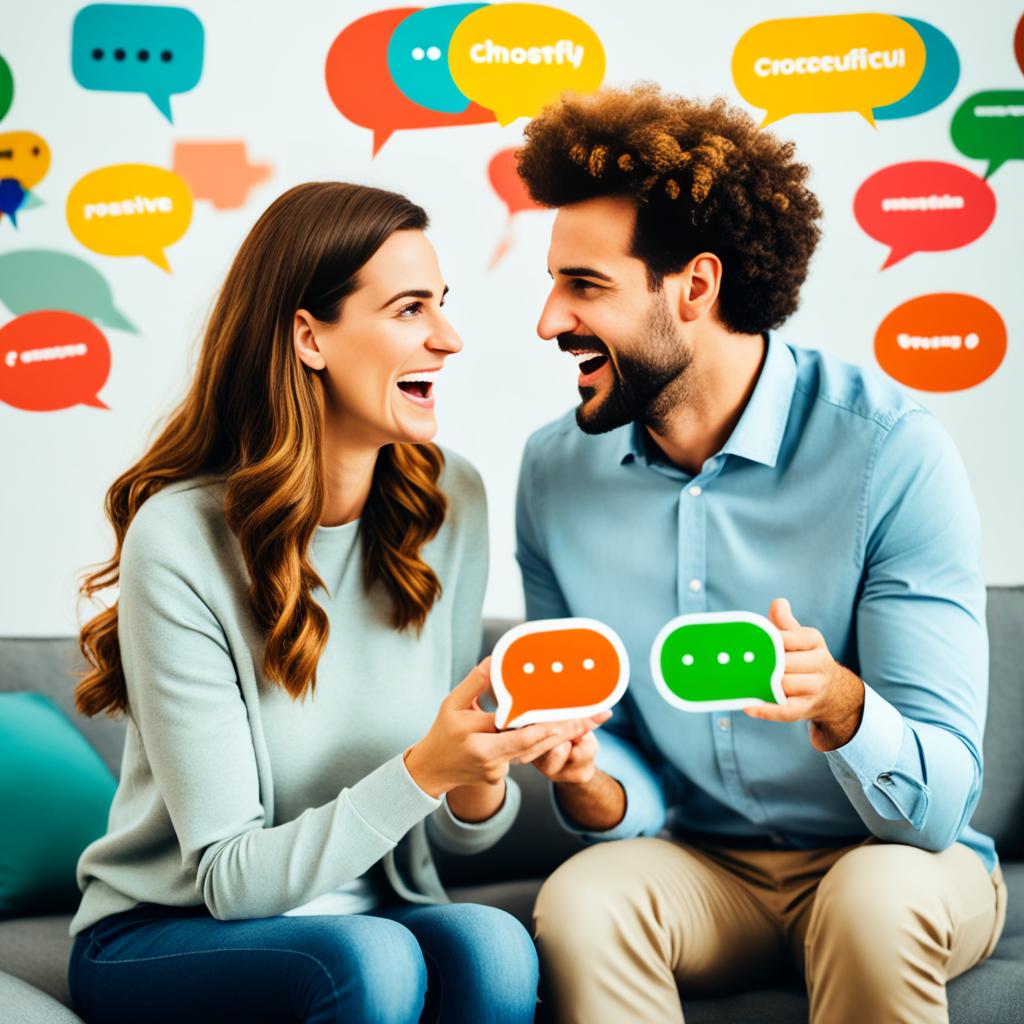How to Improve Communication in Relationships | Advice
Good communication is key to a healthy relationship. Talking openly and honestly can build trust and understanding. But, it’s not always simple to get better at talking. There can be obstacles like not saying what you mean, avoiding topics, or being too forceful.
There are steps that help make talking easier and more effective. For instance, it’s important to listen well and try to understand each other. Also, speaking about yourself with “I” statements can be less confrontational. This way, you can solve disagreements and strengthen your bond.
Key Takeaways
- Effective communication is essential for building trust and intimacy in a relationship.
- Identifying and addressing communication barriers, such as passive aggression and aggressive speech, is the first step toward improvement.
- Strategies for better communication include processing emotions, using “I” statements, active listening, setting clear boundaries, and regularly checking in.
- Relationship counseling can help couples develop new tools for healthy communication and resolve underlying issues.
- The key to improving communication is a shared commitment to mutual understanding and a willingness to put in the necessary effort.
Recognizing and Overcoming Communication Barriers
Relationship advice communication is more than just talking. It’s about understanding and fixing issues that stop good talks. Passive aggression and aggressive speech are often seen in couples.
Passive Aggression and Avoidance
Passive aggression means showing anger in secret ways. This might be making fun of your partner’s late arrivals or keeping quiet as a form of punishment. But, avoiding problems only makes things worse. The problems grow and can harm trust and healthy communication in a relationship.
Aggressive Speech and Defensiveness
Talking aggressively, like yelling or blaming, is bad for communication. It makes the other person defensive. This situation makes it hard to agree or solve problems positively. Building emotional intelligence and having empathy in relationships can lead to better, nonviolent communication.
To beat these challenges, deal with your feelings first. Then, pick the right moment to chat and use “I” statements. This can promote better active listening and mutual understanding. With effort and seeking help in couples therapy or relationship counseling, learning to talk in a healthy way is possible.
relationship advice communication

To have good relationship advice communication, you need to handle your emotions well. Before you talk about a problem, make sure you understand and control your feelings. This keeps the talk positive and helps find solutions that both of you can agree on. It stops fights before they start.
Process Emotions First
When trouble comes, the first thing to do is think about your feelings. Maybe you’re upset or mad. Figuring out why you feel that way is key. It makes you better at sharing your thoughts and feelings. This kind of self-understanding also makes it easier to see things from your partner’s side.
Use “I” Statements and Active Listening
After sorting through your emotions, talk with your partner. Use “I” statements to say how you feel, like “I feel hurt when…” This approach stops fights and lessens the chance your partner will get defensive. It’s also crucial to listen actively. Try to see things from their view. Remember, the aim is to understand each other, not to prove who’s right.
Set Clear Boundaries and Check-In
Talk freely and keep up with each other’s feelings. Decide on limits and talk often. For example, talk about spending big money first or see a therapist together. Checking in helps you stay close and avoid big problems. It builds trust and makes your bond stronger each day.
Conclusion
Good communication is vital for a strong relationship, but it isn’t always easy. When a couple has trouble talking, seeking help from a therapist can make a big difference. They can learn new ways to talk and understand deep issues. It’s important to break down what stops them from talking and learn to listen without letting ego get in the way.
Working hard at talking well can lead to greater trust, intimacy, and a closer connection. It means really listening to each other and showing you care. By learning how to talk kindly, even about difficult things, couples can tackle their problems. Over time, they grow more united.
Good communication isn’t just about getting better at talking. It’s something you have to keep doing, every day. This means being open with each other, being willing to listen, and truly wanting to get each other. When talking in a positive way is a top priority, couples can handle fights better. They can share their wants and create long-lasting love.






